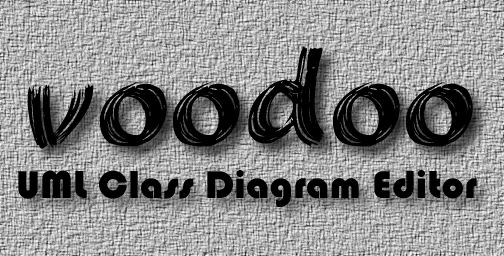

The Voodoo UML class diagram editor is a UML class diagram editor. That is, it allows someone to draw a model of the static structure of a system (a class diagram) in a standard industry-wide notation (UML).
It is also a very portable, self-documented (that is, the program's structure is documented with diagrams done using the program itself), object-oriented, buzzword-compliant piece of software.
It was originally written for a software engineering course (COEN431) at Concordia University; since that time, it has been significantly enhanced and cleaned up, mostly as part of a project course (COEN490) at the university as well.
The full list of people who have, at one time or the other, worked on the project, is available in the THANKS file.
The program is made available free of charge, but with (non)-restrictions on its distribution; it is licensed under the GNU LGPL.
You'll need Tcl/Tk version 8.0.5 or later. The program has been tested on Linux, Solaris, Windows 95 and Windows NT 4.0. It was written with high portability in mind, so it should work on any platform to which Tcl/Tk 8.0.5 or later was ported.
For non-Windows platforms, you'll also need a C++ compiler to compile the stuff, because we're too lazy to build for every UNIX and Tcl version out there. You should use G++ version 2.95 for compiling. It may work with older compilers, but they aren't supported officially.
UPDATE! This now compiles under VC++, but the DSP files tend to be a bit behind (they are as I write this). Also, the current build system works much better with Tcl/Tk 8.3.x (we use the Tcl and Tk stubs).
The provided Makefile compiles using g++. Use version 2.95 or later; there's no good reason you should use any older version than that.
You'll also need the development libraries for Tcl/Tk version 8.0.5 or later. They should be properly installed. We have tested with Tcl/Tk 8.0.5 and 8.3.2; it works rather well with both. 8.3.2 is the supported configuration.
For compiling under Win32, the provided Makefile assumes you are using the Mingw32 environment for your compilation. There are .dsp and .dsw files for VC++ compiler users, but they are usually a bit out of date (I don't have that beast at home). You'll need the libraries for Tcl/Tk as well.
The current ``stable'' version is Version 1.99.11. The source archive contains files necessary to build the system. The Win32 executable contains a dynamically-linked executable for Windows 9x and NT 4.0 or later (linked for Tcl/Tk 8.1+).
The manual (PDF file, ~260 KB) points out how to use the program. Other documents are available in the source archive.
The canonical source for the project's files is the SourceForge repository. Follow the site's instructions to get anonymous CVS access. To gain write access to the repository, please contact the current maintainer, and make sure you mention what you've changed so he can stick you in the THANKS file. Note that the CVS version is not guaranteed to work at all--use it at your own risks.
You can also see the CVS repository through the CVS web interface.
If you found a bug, please report it in the Voodoo Sourceforge Project Page. Go to the Bug Reporting section and enter your bug. Note that it sometimes takes some time for the developers to see and fix your bug. If you have a patch for the bug, please submit it in the Patch Manager as well as report the bug itself, and we'll be eternally grateful.
Remember that even something as ``trivial'' as reporting a bug helps the project become better. So, if you find one, don't be shy! Report it!
Glad you asked! Voodoo is a Free Software project, and although the current maintainer likes messing with it, more developers are always welcome.
To register as a developer, you'll need to register as a developer on SourceForge. Once you've done this, e-mail your SourceForge ID to the project's adminstrator. Please include a small blurb on your past experience in programming; this is not because we're elitists, it's just that we don't want some random bozo messing up the CVS repository.
You should gain full CVS access within a few days. The project administrator will send you a confirmation e-mail.
How can you help with the project? Well, before you do, you
should read the design document (located in
design/design.texi in the source distribution) and try
playing a bit with the source. Feel free to bug the maintainer with
questions on how the code works--remember, there are no stupid
questions! Once you feel comfortable, here's a (more or less
up-to-date) list of things to do:
vector<> and map<> partial
specialization for all pointers to void* to reduce
code size. I'm confident we could make the application a bit
smaller by doing so. A similar solution for the double pointers
would be great too, although I'm not holding my breath here.
Here's a list of features I don't especially expect to implement anytime soon, but I think the necessary framework is there to do so. It's just that they're sort of pipe dreams.
We provide two installation guides: The guide for people compiling themselves, and The guide for people installing the Win32 executable.
Comments? Suggestions? Email-me at Benoit Goudreault-Emond <bge@crosswinds.net>
Last modified: Sat Dec 2 01:58:05 EST 2000